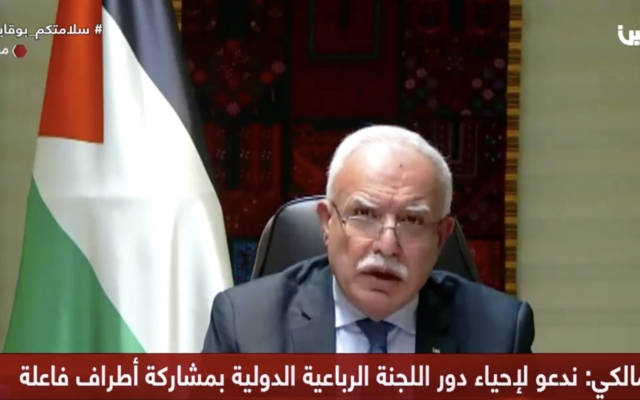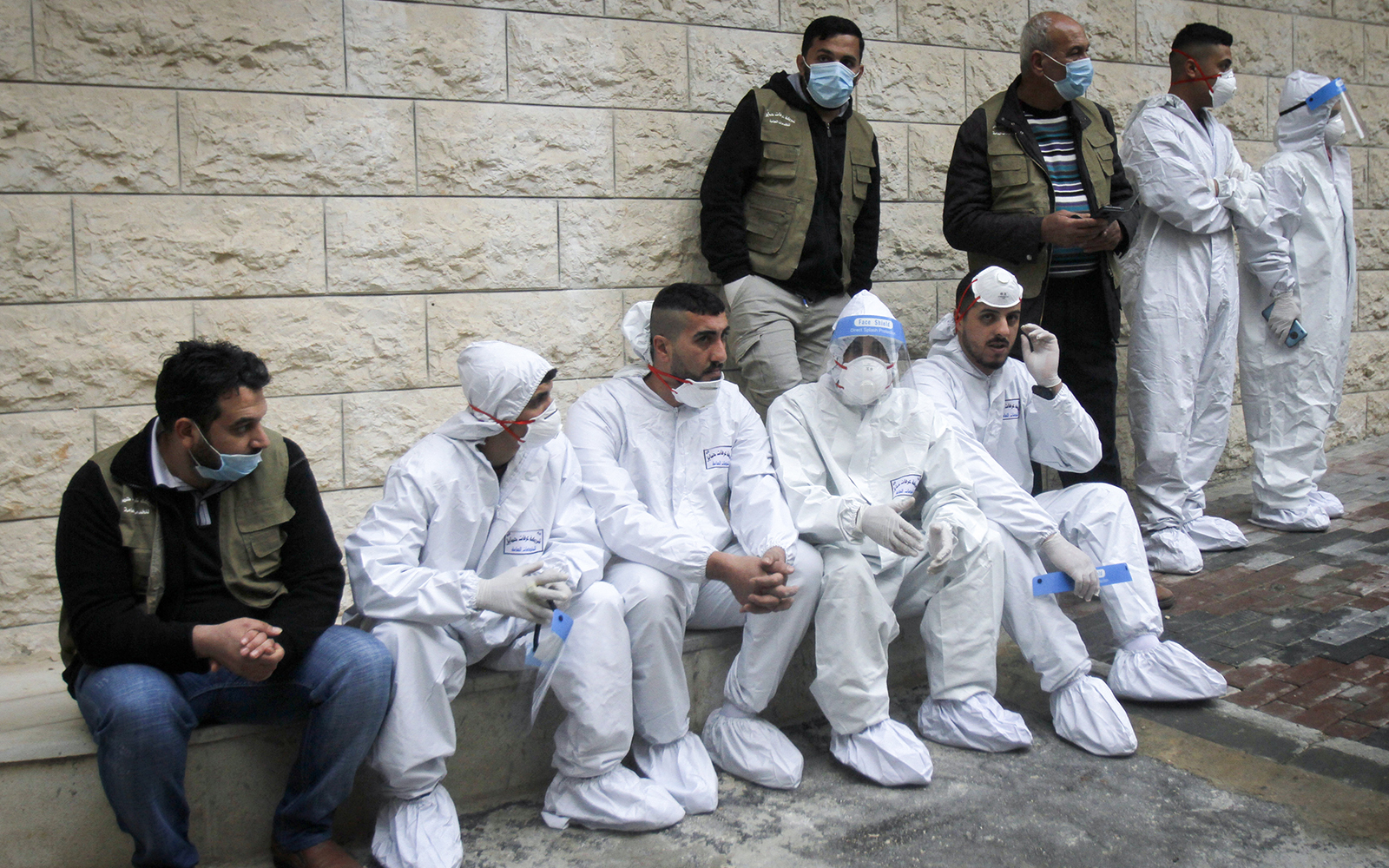Palestinian Authority foreign minister claims Israel is obligated to inoculate population; Israeli envoy retorts that Oslo Accords charge PA with providing immunizations

In a speech to the United Nations Security Council, Palestinian Authority Foreign Minister Riyad al-Maliki on Tuesday criticized Israel for failing to provide coronavirus vaccines to the Palestinians.
Speaking via videoconference, the Palestinian envoy said Israel “has not provided any vaccine to the Palestinian people under occupation to this day, denying its obligation to do so.”
The Palestinians have yet to formally ask Israel to inoculate wide swathes of their population, although a request by Ramallah for 10,000 vaccines for frontline healthcare workers was reportedly rejected by Israel.
Israel’s ambassador to the UN Gilad Erdan said such claims of Israeli obligations were “false and grotesque.” Erdan argued that the Oslo Accords, a series of bilateral agreements between Israel and the Palestinians, delegate the responsibility for immunizations to the Palestinian Authority.
“Israel is leading a successful vaccination campaign that includes all parts of Israeli society,” he added. Israel has administered the first shot of the vaccine to over 2.7 million of its citizens, and the second dose to 1.3 million.
Ramallah has also sent mixed signals on whether Israel ought to provide vaccinations for the Palestinians. Palestinian health officials have said that they are not planning to receive any shots from Israel, and have vigorously denied reports that Israel transferred 200 doses of coronavirus vaccine as a humanitarian gesture.
The PA Foreign Ministry has previously said that Israel’s legal obligations to the welfare of the Palestinians did not constitute “an abdication in any way of the responsibilities of the State of Palestine towards the Palestinian people, including providing healthcare and COVID vaccinations.”
Speaking to the international body, Al-Maliki further contended that Israel still intends to annex parts of the West Bank. Israel’s annexation push was suspended in August as part of a deal to normalize ties with the United Arab Emirates.

“Does anyone really believe that Israel has actually canceled its annexation plans?” he said, pointing to the approval of thousands of new housing units over the Green Line in recent weeks.
Veteran Norwegian diplomat Tor Wennesland, who assumed the role of UN Special Coordinator for the Middle East Peace Process this week, hailed Israel’s vaccination efforts. He stopped short of saying Israel was obligated to immunize the Palestinians, however.
“The UN continues to encourage Israel to help address the priority needs of Palestinians in the occupied Palestinian territories and to support COVID-19 vaccine availability more generally. This will be critical for the broader efforts of both Governments to control the pandemic and is also in line with Israel’s obligations under international law,” he said.
Wennesland praised what he deemed to have been close cooperation between Israel, international organizations and the Palestinians throughout the pandemic.
“It is important that the same level of engagement and cooperation be sustained with regard to the delivery of vaccines,” Wennesland said.

While Israel has sprinted ahead in vaccinating its citizens against the coronavirus, Palestinians in the West Bank and Gaza have yet to begin a widespread immunization campaign. Israel is reportedly paying around NIS 1 billion ($305 million) to receive the vaccine doses, far more than the Palestinians have indicated they can afford to pay.
The matter has raised concerns on both sides of the Green Line. Some Israeli health experts have indicated there can be no herd immunity in Israel without Palestinians getting inoculated against the virus as well.
“The message is very simple: We are one epidemiological unit. As much as we can, we have to help them address this matter,” recently departed Health Ministry director-general Moshe Bar Siman-Tov told The Times of Israel last week.
Human rights groups have called for Israel to provide vaccines to the Palestinians, who live under Israeli military rule.
“Nothing can justify today’s reality in parts of the West Bank, where people on one side of the street are receiving vaccines, while those on the other do not, based on whether they’re Jewish or Palestinian,” said Omar Shakir, Israel and Palestine director at Human Rights Watch.
Israeli officials have responded that the Palestinians are responsible for vaccinating their own people according to bilateral agreements between the two sides, although some have said that Israel will consider providing immunizations once all Israelis are vaccinated.
The Palestinian Authority has announced deals with four companies to provide doses for Palestinians in the West Bank and Gaza: AstraZeneca, Moderna, the Chinese government-backed Sinopharm, and the Russian-backed Sputnik V. An initial shipment of the Sputnik vaccine — enough to vaccinate 50,000 Palestinians — is scheduled to arrive in February, according to statements by Palestinian and Russian officials.
A Palestinian official estimated that the AstraZeneca vaccine would not arrive in Ramallah until mid-March, adding that Ramallah had already paid half of the doses’ cost upfront to the British pharmaceutical company. The rest of the vaccines, the official said, might not arrive until the end of 2021.
As reported by The Times of Israel
